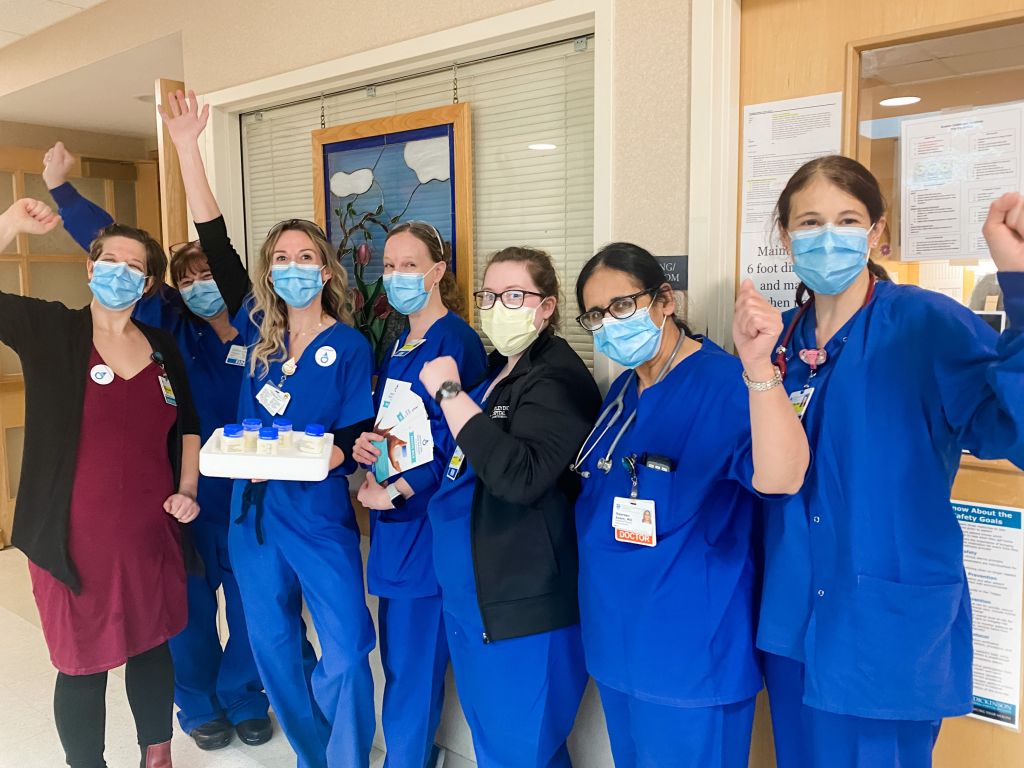November 15, 2021
November 15, 2021
NORTHAMPTON – Cooley Dickinson Hospital’s Childbirth Center announces the launch of a new donor milk program, in partnership with Mothers’ Milk Bank Northeast*, a nonprofit community milk bank operating under the guidelines of the Human Milk Banking Association of North America (HMBANA).
“I am thrilled that we have initiated a donor milk program here at CDH,” says Margaret-Ann Azzaro, RN, Cooley Dickinson’s Director of Medical Surgical & Childbirth Services. “This demonstrates our strong commitment to supporting the families in our community in reaching their breastfeeding goals. The donor milk program aligns perfectly with our Baby Friendly Designation and our duty to support the health of infants.”

The milk bank collects milk from birth parents who have more milk than their babies need; screens, pasteurizes, and tests the milk; then dispenses it to babies whose birth parents do not have enough milk for them.
Milk donor screening, modeled after blood donor screening, includes health history, physician approval, and blood test. Milk from birth parents who pass the screening is also pasteurized and tested by an independent lab to ensure safety before being dispensed to hospitals or families. Mothers’ Milk Bank Northeast has been screening donors, pasteurizing milk, and dispensing to over 90 hospitals and to families throughout the Northeastern United States since 2011.
In Massachusetts, in addition to serving hospitals, Mothers’ Milk Bank Northeast also provides milk to an outpatient donor milk dispensary at Northampton Area Pediatrics and operates five depots (including the Northampton location), where screened donors can drop off milk for shipment to the milk bank. With the launch of the donor milk program at Cooley Dickinson’s Childbirth Center, area families now have a full range of donor milk services available in their community.
Donor milk can be lifesaving for preterm infants.
Donor milk can be lifesaving for preterm infants. It is especially protective against a life-threatening condition called necrotizing enterocolitis (NEC), which affects one in ten of the smallest preterm infants. A human milk diet is estimated to lower the risk of this condition by 79%. It also lowers hospital costs by reducing costs for care and shortening hospital stays.
While donor milk is now widely used for preterm babies in hospitals with neonatal intensive care units (NICUs), Cooley Dickinson is on the leading edge of hospitals offering it in mother-baby and special care units. In the case of full-term and near-term births, pasteurized donor human milk (PDHM) can be offered as a medical supplement, or “bridge milk,” until the birth parent’s own milk supply increases, and for medical issues such as hypoglycemia, hyperbilirubinemia, excessive weight loss, and latch problems.
The importance of breastfeeding for the health of the birth parent and baby is well-established, with all major medical and public health organizations endorsing breastfeeding. Use of donor milk supports breastfeeding in the long run. When a baby requires supplementation in the early days after birth, research shows that birth parents tend to view donor milk as a temporary bridge and formula as a long-term solution. Thus having donor milk available as a supplement can be an essential component in preserving and protecting breastfeeding for birth parents and babies. “Our goal is always to have mothers nurse their own babies, but sometimes it is necessary to provide a supplement while the milk comes in,” commented Dr. Robert M. Insoft, medical director of Mothers’ Milk Bank Northeast.
“I am so proud to work with Amy Walker, CNM, and Lisa Fitzgerald, IBCLC, without whose efforts the Human Milk Bank at Cooley Dickinson would not be happening,” says Helena McCracken, MD, Chief of Pediatrics at Cooley Dickinson Hospital. “I’m also thankful for Cooley Dickinson’s commitment to equity, which makes it possible for all families regardless of their ability to pay to benefit from this program.”
Families and health care providers seeking more information on receiving or donating milk can check the milk bank’s website at https://milkbankne.org/.
*While the name of our new partner agency is Mothers’ Milk Bank Northeast, at Cooley Dickinson we embrace diversity, respect differences and strive for health equity in the care we provide to all people. Therefore, we recognize that not all parents who breast/chestfeed identify as mothers. Learn more about Cooley Dickinson’s values.

